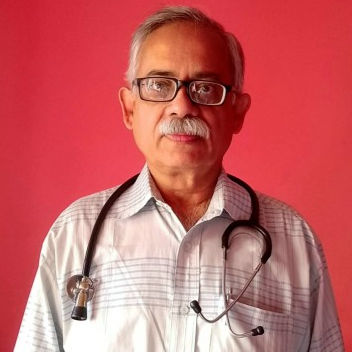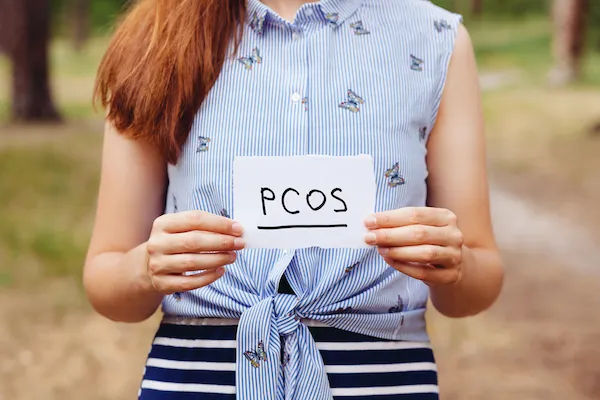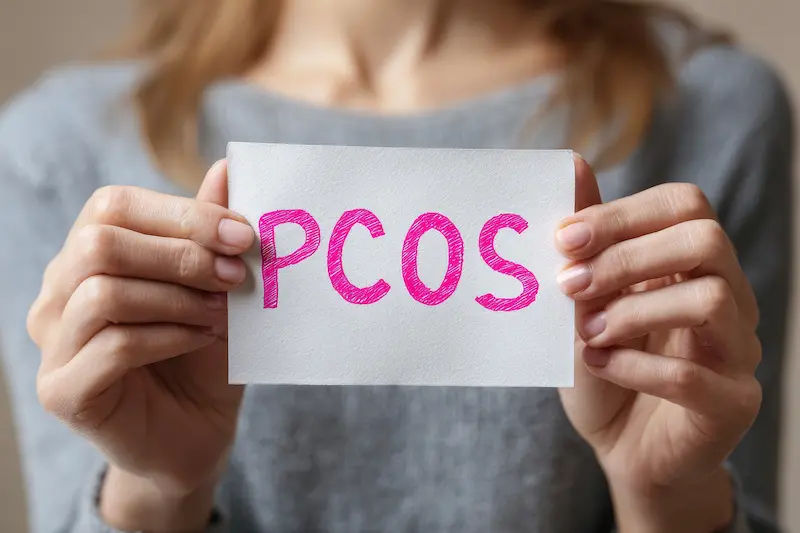Guide to Living With Pcos
Manage your PCOS symptoms effectively! Our comprehensive guide offers practical advice on diet, lifestyle changes, treatment options, and emotional wellness for women living with Polycystic Ovary Syndrome.


Introduction
Receiving a Polycystic Ovary Syndrome (PCOS) diagnosis can feel overwhelming. With a mix of confusing symptoms—from irregular periods and weight gain to acne and fatigue—it’s easy to feel alone and uncertain about the future. But here’s the most important thing to know: PCOS is a manageable condition, and with the right knowledge and tools, you can absolutely live a vibrant, healthy life. This guide is designed to be your comprehensive roadmap. We’ll move beyond simply defining PCOS to explore practical, holistic strategies for managing your symptoms, improving your metabolic health, and taking control of your well-being. Whether you’re newly diagnosed or have been navigating this journey for years, this article will provide evidence-based insights on everything from diagnosis and nutrition to mental health and long-term planning, empowering you to thrive, not just survive.
What exactly is PCOS? Beyond the Ovarian Cysts
Polycystic Ovary Syndrome is often misunderstood as solely a reproductive issue. In reality, it’s a complex hormonal imbalance and metabolic disorder that affects the entire body. The name itself is a bit misleading; not everyone with PCOS has cysts on their ovaries, and having cysts doesn't automatically mean you have PCOS. Fundamentally, PCOS is characterized by a combination of factors that disrupt the normal functioning of your ovaries and your body's ability to manage insulin.
The Hormonal Rollercoaster: Androgens and Insulin
Two key players are at the heart of most PCOS symptoms:
1. High Androgens: Often called "male hormones," androgens like testosterone are present in all women, but in lower levels. In PCOS, the body produces excess androgens, which can disrupt ovulation, cause acne and oily skin, and lead to hirsutism (excessive hair growth on the face, chest, and back).
2. Insulin Resistance: This is a core feature for many with PCOS. Insulin is a hormone that helps your cells use sugar (glucose) for energy. With insulin resistance, your cells don't respond to insulin effectively, so your pancreas produces even more to compensate. This high insulin level exacerbates the problem by stimulating the ovaries to produce more androgens, creating a frustrating cycle.
Root Causes: Genetics, Insulin Resistance, and Inflammation
While the exact cause of PCOS is unknown, research points to several key factors:
- Genetics: PCOS often runs in families, suggesting a strong genetic link.
- Insulin Resistance: As discussed, this is a primary driver for up to 70% of women with PCOS, contributing directly to weight gain and difficulty losing weight.
- Low-Grade Inflammation: Women with PCOS often have chronic, low-grade inflammation, which can stimulate polycystic ovaries to produce androgens.
- Understanding these root causes is the first step toward effective management, shifting the focus from just treating symptoms to addressing the underlying imbalances.
Consult Top Specialists for Personalised Tips
Recognizing the Signs: Common and Surprising PCOS Symptoms
PCOS manifests differently in every individual. Some women experience severe symptoms, while others have only mild signs. Being aware of the full spectrum is crucial for seeking help.
Physical Symptoms (Hirsutism, Acne, Weight Gain)
- Irregular Periods: This is one of the most common signs. This includes periods that are infrequent (fewer than eight cycles a year), irregular, or prolonged.
- Excess Androgen-Related Symptoms: Visible signs like hirsutism, severe acne that doesn't respond to typical treatments, and thinning hair on the scalp (female-pattern baldness).
- Weight Gain and Difficulty Losing Weight: Particularly around the abdomen, due to insulin resistance.
- Acanthosis Nigricans: Dark, velvety patches of skin in body folds like the neck, groin, and under the breasts.
Metabolic and Internal Symptoms (Irregular Periods, Mood Swings)
- Fertility Challenges: Lack of or irregular ovulation is a leading cause of infertility in women with PCOS.
- Mood Changes: The hormonal fluctuations and challenges of managing a chronic condition can increase the risk of anxiety and depression.
- Sleep Problems: Sleep apnea is more common in women with PCOS, often linked to weight and metabolic factors.
- Fatigue: Low energy levels are a frequent complaint, potentially linked to blood sugar dysregulation.
If you identify with several of these symptoms, it’s important to consult a healthcare professional for a proper evaluation. If symptoms like irregular periods or unexplained weight gain persist, consulting a doctor online with Apollo24|7 can be a convenient first step to discuss your concerns.
Getting a Diagnosis: The Path to Clarity
There is no single test for PCOS. Diagnosis is based on a combination of your medical history, a physical exam, and specific tests. Doctors typically use the Rotterdam Criteria, where you need to meet at least two of the following three criteria:
The Diagnostic Criteria: What Doctors Look For
1. Irregular or Absent Ovulation: Usually indicated by irregular or absent menstrual cycles.
2. Clinical or Biochemical Signs of High Androgens: This means either physical signs (like hirsutism or acne) or blood tests showing high androgen levels.
3. Polycystic Ovaries on Ultrasound: An ultrasound scan may show multiple small follicles (often mistakenly called cysts) on the ovaries.
Essential Tests for PCOS (Blood Tests, Ultrasound)
To confirm the diagnosis and rule out other conditions, your doctor will likely order:
- Blood Tests: These check hormone levels (androgens, LH, FSH), thyroid function, and cholesterol. A key test is for insulin resistance, often through fasting insulin and glucose levels. Apollo 24|7 offers convenient home collection for tests like HbA1c and comprehensive hormone panels, making the process easier.
- Pelvic Ultrasound: This transvaginal or abdominal ultrasound looks at the appearance of your ovaries and the thickness of your uterine lining.
Building Your PCOS Management Toolkit: A Multi-Faceted Approach
Managing PCOS effectively requires a holistic strategy. Think of it as building a personalized toolkit where each tool addresses a different aspect of the condition.
Nutrition for PCOS: Fueling Your Body for Balance
Diet is one of the most powerful tools for managing PCOS symptoms. The goal is to stabilize blood sugar and reduce insulin resistance.
Best Foods for PCOS and Insulin Resistance
- High-Fiber Vegetables: Broccoli, cauliflower, leafy greens, and peppers help slow sugar absorption.
- Lean Protein: Chicken, fish, tofu, and legumes promote satiety and have a minimal impact on blood sugar.
- Healthy Fats: Avocado, olive oil, nuts, and seeds help reduce inflammation.
- Low-Glycemic Fruits: Berries, apples, and oranges are better choices than high-sugar fruits or juices.
- Complex Carbohydrates: Whole grains like quinoa, oats, and brown rice provide sustained energy.
Foods to Limit or Avoid with PCOS
- Refined Carbohydrates: White bread, pasta, pastries, and sugary cereals cause rapid blood sugar spikes.
- Sugary Drinks: Sodas, sweetened juices, and energy drinks are major contributors to insulin resistance.
- Highly Processed Foods: These often contain unhealthy fats, sugars, and additives that promote inflammation.
The Power of Movement: Exercise as Medicine
Regular physical activity is non-negotiable for improving insulin sensitivity. A combination is best:
- Cardio (Walking, Swimming, Cycling): Helps burn glucose for energy.
- Strength Training: Building muscle mass improves your body's ability to use insulin effectively long-term. Even two sessions a week can make a significant difference.
Medical Interventions: When and Why They Help
Lifestyle changes are the foundation, but medications can be crucial for many.
Medications for Regulating Periods and Reducing Androgens
- Hormonal Birth Control: Pills, patches, or rings can regulate menstrual cycles, reduce androgen levels, and clear acne.
- Metformin: Originally a diabetes drug, Metformin improves insulin sensitivity and can help with weight loss and cycle regulation.
- Anti-Androgen Medications: Drugs like spironolactone can block the effects of androgens, reducing hirsutism and acne.
Managing PCOS and Fertility Challenges
For those trying to conceive, how to get pregnant with PCOS is a primary concern. Medications like Letrozole or Clomiphene are often used to induce ovulation. If your condition does not improve after trying lifestyle methods, booking a physical visit to a specialist with Apollo24|7 can help you create a personalized fertility plan.
Stress, Sleep, and Mental Health: The Often-Overlooked Pillars
Chronic stress elevates cortisol, which can worsen insulin resistance and cravings. Prioritizing 7-9 hours of quality sleep and incorporating stress-reduction techniques like yoga, meditation, or even simple breathing exercises are vital components of a PCOS management plan.
Long-Term Health: Reducing Your Risks
With proper management, the long-term health risks associated with PCOS—such as Type 2 diabetes, high blood pressure, heart disease, and endometrial cancer—can be significantly reduced. Consistent management through diet, exercise, and regular check-ups is your best defense. This makes building sustainable habits more important than seeking quick fixes.
Conclusion: Thriving, Not Just Surviving
Living with PCOS is a journey, not a destination. It requires patience, self-compassion, and a proactive approach to your health. There will be good days and challenging days, but by understanding your body, building a supportive healthcare team, and implementing the multi-faceted strategies outlined in this guide, you can shift from a place of frustration to one of empowerment. Remember, you are not defined by your diagnosis. PCOS is a part of your story, but it doesn't have to control the narrative. Use this knowledge to take the next step, whether it's refining your diet, starting a new exercise routine, or having a more informed conversation with your doctor. You have the power to thrive.
Consult Top Specialists
Consult Top Specialists for Personalised Tips

Dr. Rajib Ghose
General Physician/ Internal Medicine Specialist
25 Years • MBBS
East Midnapore
VIVEKANANDA SEBA SADAN, East Midnapore

Dr. Ajay K Sinha
General Physician/ Internal Medicine Specialist
30 Years • MD, Internal Medicine
Delhi
Apollo Hospitals Indraprastha, Delhi
(225+ Patients)

Dr Aakash Andgi
General Physician/ Internal Medicine Specialist
9 Years • MBBS MD
Bengaluru
Apollo Clinic, JP nagar, Bengaluru

Dr. Swarna Deepak K
General Physician/ Internal Medicine Specialist
20 Years • MBBS: MD (Internal Medicine) MRCP (UK), EDIC (European Diploma in Critical Care), IDCCM, IFCCM (Critical Care), FID (Royal Liverpool Academy)
Hyderabad
Apollo Hospitals Jubilee Hills, Hyderabad
(425+ Patients)

Dr. Pinaki Mukhopadhyay
General Physician/ Internal Medicine Specialist
33 Years • MBBS
Kolkata
MCR SUPER SPECIALITY POLY CLINIC & PATHOLOGY, Kolkata
(25+ Patients)
Consult Top Specialists

Dr. Rajib Ghose
General Physician/ Internal Medicine Specialist
25 Years • MBBS
East Midnapore
VIVEKANANDA SEBA SADAN, East Midnapore

Dr. Ajay K Sinha
General Physician/ Internal Medicine Specialist
30 Years • MD, Internal Medicine
Delhi
Apollo Hospitals Indraprastha, Delhi
(225+ Patients)

Dr Aakash Andgi
General Physician/ Internal Medicine Specialist
9 Years • MBBS MD
Bengaluru
Apollo Clinic, JP nagar, Bengaluru

Dr. Swarna Deepak K
General Physician/ Internal Medicine Specialist
20 Years • MBBS: MD (Internal Medicine) MRCP (UK), EDIC (European Diploma in Critical Care), IDCCM, IFCCM (Critical Care), FID (Royal Liverpool Academy)
Hyderabad
Apollo Hospitals Jubilee Hills, Hyderabad
(425+ Patients)

Dr. Pinaki Mukhopadhyay
General Physician/ Internal Medicine Specialist
33 Years • MBBS
Kolkata
MCR SUPER SPECIALITY POLY CLINIC & PATHOLOGY, Kolkata
(25+ Patients)
More articles from Pcos
Frequently Asked Questions
Can PCOS be cured?
There is currently no cure for PCOS, but it can be managed very effectively. With the right lifestyle changes and medical support, most women can control their symptoms and reduce long-term health risks, leading a full and healthy life.
What are the best natural remedies for PCOS?
While not a replacement for medical advice, some well-researched supplements may help. Inositol has shown promise in improving insulin sensitivity and ovarian function. Spearmint tea may help reduce androgen levels, and omega-3 supplements can combat inflammation. Always consult your doctor before starting any new supplement.
I have PCOS but I'm not overweight. Is that possible?
Yes. This is known as 'lean PCOS.' While weight gain is a common symptom, up to 20% of women with PCOS are at a normal weight or underweight. They still experience insulin resistance and hormonal imbalances, so management focuses on the same principles of diet, exercise, and medical care.
Does having PCOS mean I can't get pregnant?
No. PCOS is a leading cause of infertility due to irregular ovulation, but it does not mean you cannot get pregnant. Many women with PCOS conceive successfully with the help of lifestyle changes, ovulation-inducing medications, and assisted reproductive technologies.
How is PCOS different from thyroid problems?
Both can cause irregular periods and weight changes, but they are distinct conditions. PCOS is characterized by high androgens and ovarian issues, while thyroid disorders involve an underactive or overactive thyroid gland. Blood tests can easily distinguish between the two, which is why proper testing is essential.




